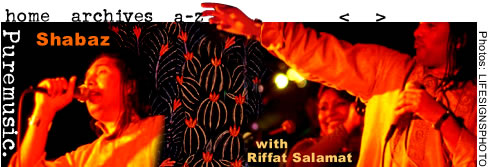
CLOTHESLINE
REVIVAL INTERVIEWS
A Conversation with Sukhawat Ali Khan (continued)
PM: Sukhawat, is your dad still alive?
SAK: No, my father passed away last year.
PM: Last year, oh…
SAK: His name is Ustad Salamat Ali Khan. He was a great classical singer. He was very famous, he and his brother. They were duet singers. That’s why my sister [Riffat Salamat] and I sing together. Duet is of our tradition. We were the first, in our family, several hundred years back, who started duet singing. So always my family did something new. And we keep digging in to something that hasn’t been done, like now when we’re creating a fusion, to keep making the tradition new.
PM: Are you also related to Nusrat Fateh Ali Khan?
SAK: Actually we have some kind of relation, but not too close. Nusrat Fateh Ali Khan put that beautiful sargum into Qawwali music, which made him very popular. He listened to my father a lot, and he’s said in his interviews that his ideal was my father, Ustad Salamat Ali Khan. Also my uncle, Nazakat Ali Khan. They were very famous as the Ali Brothers, in the late 60s and 70s, in Europe–somehow they couldn’t come to America then.
PM: Not only famous in Pakistan and in India, but they were famous also in Europe.
SAK: Oh yes, very famous in Europe. In England, in Holland, in Germany, in Italy. They performed at many, many festivals. They even went to Russia for performances.
The part of music that made Nusrat Fateh Ali Khan very popular, it was his sargum. Sargum is like Do Re Me Fa, it is like… [He sings an example, tight sets of scales that then loosen and slide outward.] That’s not Qawwali style, that’s the traditional Indian Pakistani musical style.
PM: Is the sargum considered part of a lighter style or a folk style or…?
SAK: The sargum could be used in anything. The way it’s used could be lighter, or could be folky. There’s a way to use it, if you do it very heavily, then it’s like [sings a quick pattern of low notes that bend into each other], that’s more classical. In a fusion, you should stay kind of from folk to Qawwali style. Then you do a high-pitched, softer sargum. [He sings a high, sweet fluttering of notes.] Kind of like that. And these riffs are called alap. I did a lot of alap on Receive, because it’s all about feeling–sometimes I had no words but just feeling.
PM: And on Receive, I get the impression that the music would play and you would basically improvise your singing part. Is that right?
SAK: That’s true.
PM: You would sing whatever you feel.
SAK: Yes! I’m so glad that Conrad–well, he was very nice. He just let me do what I felt. Also he believed in our energies, I guess. He would say, "This is the music. This is the feel of what I want. But you should…just sing." And I just prayed to God and started singing over it. But the credit goes to Conrad, because his music is so beautiful, it helps me do a lot of good improvisation over it. Something I always appreciate from my father: when I hear somebody play some song–like Conrad saying "This is a song" or "This is an idea, what would you sing over this?"–first of all, I figure out what is the raga in it. Those are the techniques that my father really helped me with.
PM: What is the scale I’m singing in?
SAK: Yes. It may be a different Western scale, but this still works. Luckily I had this teaching from my father. And now I am teaching also in the Bay Area.
PM: Are you touring a lot?
SAK: My band and I just came back from the Montreal Jazz Festival. They really love us there, they’ve invited us two times in a row. We also went to New York, to the Prospect Park Brooklyn Jazz Festival. This summer we did some good shows, also in Los Angeles.
PM: I hope to get out to the West Coast in the next couple of months, and I must meet you and Sachiko, and also Conrad and Robert.
SAK: Of course. And I just want to say that Conrad is not only a great artist, but he has a vision, a vision of a new kind of music. He is open and looking for the new ideas, and that is the beauty part. We need artists and producers like him. Mainstream producers, sometimes they just stay around one thing, which may be nice but…they limitize.
PM: I agree. He’s a visionary.
SAK: Yes. He is one who can do that.
PM: And I think that you are too. I look forward to checking out the CDs of Shabaz and of Sachiko Kanenobu.
SAK: Thank you. I am so glad that you like our music, and Conrad’s music. This means a lot to us. Keep in touch, my friend, and God bless you.
PM: God bless you, Sukhawat. And thank you for your time today. continue
jump to:
Wendy Allen Tom
Armstrong Robert Powell
Conrad Praetzel
puremusic archives puremusic home